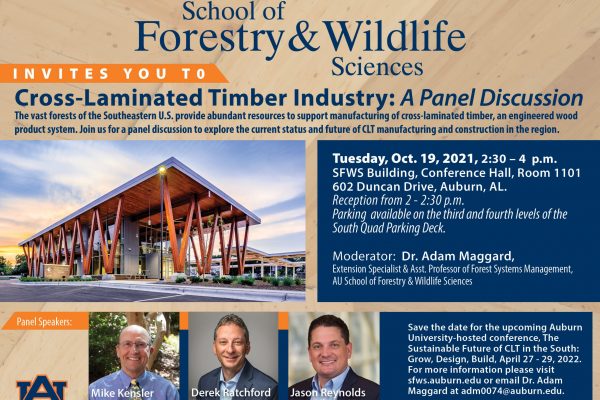The Auburn University School of Forestry and Wildlife Sciences will host the “Cross-Laminated Timber Industry: Current Status and Future” panel discussion and reception on Tuesday, Oct. 19, from 2-4:30 p.m.
The event will be held in the Conference Hall, room 1101, in the Forestry and Wildlife Sciences Building at 602 Duncan Drive in Auburn, Alabama. Industry stakeholders, faculty, students and members of the public are welcome to attend. Preregistration for the discussion is not necessary. Guest parking will be available on the third and fourth levels of the South Quad Parking Deck across from the school.
Cross-laminated timber, or CLT, is a prefabricated wood panel made from wood stacked and glued crosswise in alternating directions to create pressed layers. This unique engineering gives the panel exceptional strength and strong fire-protection characteristics while being light and easy to assemble.
CLT is considered a sustainable material that is safe and cost-effective for commercial construction, while offering structural simplicity and benefits such as reduced waste, improved thermal performance and design versatility.
“Because of its high strength and dimensional stability, it can be used as an alternative to concrete, masonry and steel in many building types,” said Janaki Alavalapati, dean of the School of Forestry and Wildlife Sciences. “Due to its performance compared to conventional materials, it is also gaining in popularity among residential builders.”
Guest panelists include industry representatives Derek Ratchford, CEO of SmartLam, Dothan, Alabama; Jason Reynolds, senior director, WoodWorks Wood Products Council; and Mike Kensler, director of Auburn University’s Office of Sustainability. Adam Maggard, Alabama Extension specialist and Auburn assistant professor of forest systems management, will serve as moderator.
The School of Forestry and Wildlife Sciences actively seeks to increase awareness of the many benefits of CLT and to promote its use within the South, according to Maggard.
“Due to its numerous economic and environmental benefits, the growing use of CLT shows promise for many industries within the southeastern region of the U.S., including developers and contractors, architects and engineers, and foresters and landowners,” Maggard said.
The School of Forestry and Wildlife Sciences’ Forest Products Development Center has a rich history of research, development and intellectual property advancements in the areas of adhesives and lumber improvement for engineered wood products.
“Auburn’s interdisciplinary research conducted through the Forest Products Development Center and the Samuel Ginn College of Engineering and College of Architecture, Design and Construction, combined with the university’s strong relationships with forestry stakeholders, positions it to become an epicenter for mass timber innovation,” said Brian Via, the Regions Professor in Forest Products and director of the Forest Products Development Center.
According to WoodWorks, as of March 2020, 784 mass timber projects had been constructed or were in design in all 50 states in the multifamily, commercial or institutional categories. Lending to this growth and the vast expanse of southern yellow pine in the South, there is a great deal of momentum for building with CLT and other mass timber.
To foster this emerging industry with the Southeast, the School of Forestry and Wildlife Sciences plans to host an international conference, “The Sustainable Future of CLT in the South: Grow, Design, Build,” April 27-29, 2022. For more information, email Maggard at adm0074@auburn.edu.
To learn more about upcoming conference and other CLT-related developments, visit auburn.edu/sfws.










